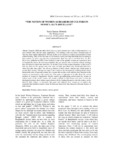The notion of women as bearers of culture in Monica Ali's Brick Lane

View/
Date
2010Publisher
BRAC UniversityAuthor
Mortada, Syeda SamaraMetadata
Show full item recordAbstract
Alistair Cormack (2006) describes Brick Lane as a 'post-colonial story' with a 'realist narrative'; to a post-colonial critic, this has many implications. Yet looking at this text from a feminist point of view has many further dimensions. Women in this novel function as a direct representation of their cultural bearing. They follow the rules set for them by society and map their behaviour according to these notions, in such a way that they institutionalize their love and as such their lives. In Ali’s Brick Lane, published in 2003, I have looked at some of the qualities women are expected to have in Bangladeshi culture, the roles/responsibilities they are meant to take on and the cultural teachings they are forced to inject into their lives. To do this, I look at the women characters in this novel; I have put them in two groups-some who carry out their prescribed roles all through their lives, others that defy these rules. Yet, all act as bearers of their culture, whether they reside inside or outside their country. Through my paper, I have analyzed the discrepancies in Bangladeshi culture between the roles of men and women, how women take on these roles and how they function in this context, as represented in this realist text. This paper is important as it talks about the current position of women in Bangladesh. Despite various groundbreaking achievements by women in various parts of the world; women still remain confined to their homes and more so into the ideological products their culture expects them to be by framing themselves into the notions set for them by their culture. In retrospect, this paper also indicates how women try to achieve the standards their families/societies create for them and hence how they themselves become bearers of their culture.
